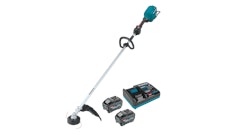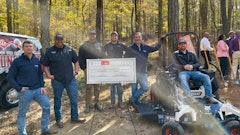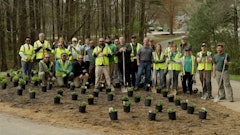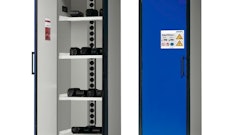
A few years ago, Joe Chiera’s lawn maintenance company was doing around $400,000 with three full-time employees. Suddenly customers began asking him to do bigger jobs—installation jobs he had virtually no experience producing. But that didn’t stop this tenacious 20-something, together with partner Micah Posten, from saying “yes.”
Since then the company, Impact Landscaping & Irrigation, has more than quadrupled in size, employs 10 times the number of people, participates in the Ohio Landscape Association (OLA) and Professional Landcare Network (PLANET), and offers a vast array of maintenance and installation services to commercial and high-end residential customers. Chiera and Posten continue to say “yes” as often as possible. But these days they’re also more apt to say “no” as they get their arms around running a big company.
“As our company has grown and matured, the market we now pursue is much more refined,” Chiera relates. “We’ve even pulled our Yellow Pages ad because we were spending so much time taking calls from people who didn’t really represent our target customer.”
TWO OVERHEADS ARE BETTER AS ONE
Chiera got his start with now wife Kristen in 1997 at the age of 17. The company, J&K Lawn Service, employed one other employee for the next three years. Then Chiera met irrigation contractor Micah Posten on a jobsite. Posten had learned the irrigation trade while working for his father’s full-service landscape company since age 15.
Chiera and Posten formed a working relationship and began marketing their businesses together to offer more full-service. After collaborating in this fashion for the next six years, the two started operating out of the same building in an effort to diffuse overhead. Chiera also changed the name of his business to Impact Landscaping in order to mirror Posten’s company name, Impact Irrigation. “We wanted to make it look like we were one company and create a stronger brand presence,” Chiera says.
BRING IT ON
For the most part, it worked. Both companies enjoyed continued growth for the next couple of years, and started fielding customer requests for bigger jobs and additional services. As intimidating as it seemed, Chiera was eager to answer the call.
“Joe’s the type of guy who’ll say ‘yeah we can do it’ and then try to figure out how later,” Posten says with a grin. “I’m more of a guy who says ‘let’s learn how to perform this service and then start looking for work.’ It was pretty nerve wracking, but I’m glad we went for it.”
Chiera explains his thought process at the time: “I figured that since the work was there, we had to do it—because it might not be there three years from now. If there’s one piece of advice I can offer in regard to branching out, it’s that you better be ready to stand behind your work. You also have to be prepared to make some mistakes and eat some costs as you perfect your skill and develop your systems.”
To get up to speed as quickly as possible, Chiera and Posten spent a lot of time talking with other contractors, including Rick Haury of Suncrest Gardens. “Rick has been a great friend and mentor,” Chiera points out. “He’s been around a long time and has a successful company. He’s offered us countless advice and has always been there to answer our questions.”
After that initial trial by fire, Impact Landscaping & Irrigation has developed expertise in a variety of installation services, including hardscaping, water features and outdoor living. Posten is certified through the Irrigation Association, Chiera is a CLT in installation, and a few other key employees are also working on their CLT’s. A licensed applicator has been hired to help grow the relatively new lawn care division.
The Make or Break Moment
How to hit a home run when
that big project comes along.
Like many contractors, Joe Chiera’s early days were spent comfortably mowing a handful of properties. He thought about expanding and growing, but wasn’t sure how—or if it would be worth the risk. He had to make his mind up in a hurry when a general contractor suddenly asked for his help on a pretty sizable project.
“We had done some smaller install projects for him in the past, and he was always pleased with our work,” Chiera recalls. “This particular job was a much larger commercial job.”
Chiera says the most important thing with jobs over $50,000 is to present your company at the highest level of professionalism:
• Always have an impressive portfolio with you
• Always have a list of references with you
• Always get to know the customer and make him or her feel like part of your family
There are also several keys to successfully completing the job and making your margin:
• You need great supervisors who you develop a plan with ahead of time – you need to talk through each phase of the project and develop realistic timelines
• Try to stick as close to the contract as possible, and anything extra should be viewed as a change order and discussed with the customer; many customers are notorious for adding and changing things on the spot, so you have to be right on top of it and get them new contracts and quotes before completing the work
As Chiera was branching from lawn maintenance into other services, he admits that much of his learning happened on the job. Being upfront and honest with customers was always at the top of his mind.
“We would always let them know we were just developing this particular area of our company, but reassured them that we would not let them down or quit until the job was right,” Chiera tells. “We also let them know they were getting a slight discount for being the ‘test run’ with that particular project. After we developed a portfolio and a couple good references, selling got much easier. Sometimes the best test runs are done on your own property, or a good friend’s or relative’s. We also did plenty of that.”
BREAK IT DOWN
Shortly after Chiera and Posten started “accepting work and figuring out how to complete it,” the duo determined it was also a good time to develop a growth plan for the company. “We wanted to be one of the premier landscape and irrigation contractors in the tough northeast Ohio market,” Chiera tells. “But not a single one of us had any idea how a million-dollar company should operate and survive.”
They brought in consultant Rod Bailey for a two-day round of consultations. “Rod explained the importance of writing your goals down,” Chiera recalls. “He also taught us the importance of focusing on each job’s profitability and accounting for all expenses—especially when you’re doing installation projects, which we wanted to start doing more of. In maintenance, it’s critical to quote your true costs, which include labor and all sorts of hidden expenses like equipment repairs. You really have to think about it and not sell yourself short.”
Following Bailey’s visit, Chiera sat down with who today are key managers to set forth a five-year growth strategy. The company went from three employees to 35 in the next three years—15 of whom were year-round. Even more astonishingly, the company actually hit its five-year sales target in a single year. “We did it by maintaining focus on our goals and involving everyone on our team,” Chiera points out. “We also modeled ourselves after other large companies in the area—really analyzing what they’ve done to get to their size and maintain it.”
TAKING CONTROL OF A GROWING COMPANY
Lesson No. 1: You have to make money while you’re growing. Chiera and Posten learned, from both Rod Bailey and other contractors, that there are different ways to approach this.
“When you’re slow, maybe during an off-season or when the market is soft, make sure you’re always bringing in enough business to cover your fixed costs,” Chiera says. “You might have to make some concessions and do some things you normally wouldn’t want to do in order for that to happen.” “But you don’t always have to come all the way down to the customer’s bottom-end price,” Posten adds. “You can often come pretty close, and then use your references and reputation to clinch it.”
Chiera is well aware of what his company’s overhead burden is, and strives to maintain a minimum gross margin on all jobs—in both maintenance and installation—to make sure it’s recovered. Of course, some projects and accounts are more profitable than others. “When you have a really profitable account, you have to baby it to death so the customer never decides to start shopping again,” Chiera says.
Delivering a minimum gross margin on all jobs leaves the owners with an acceptable net profit margin to justify all the blood, sweat and tears, and to allow for future expansion of the business. Chiera is a huge proponent of planning for the future, whether it means investing in a business expansion or simply building up some reserves for an unexpected business downturn. “We’re actually looking at opening satellite offices in the future, and potentially launching a nursery,” he points out.
Although the partners each wear many hats, Posten is more of the operations guy while Chiera works the numbers. “I used to just watch the checkbook and make sure we could make payroll and fuel our fleet,” Chiera relates. “Now I’m constantly looking at P&L’s, job summary reports and quotes. I rarely let loans go full-term in order to save on interest, and I’m always watching truck and equipment repair costs. I don’t like getting nickel-and-dimed to death. When repair bills exceed what a year’s worth of payments would be on a new truck or mower, we get a new truck or mower.”
Monitoring these crucial items—in addition to a sizeable staff and growing customer list—is a bit overwhelming, Chiera concedes. A full-time office manager and new filing system have proved invaluable. “Thanks to him,” Chiera says, “our P&L is now four pages long as opposed to a half page. It’s a lot more detailed so we really know what’s going on and what’s being spent on what.”
The new filing system consists of a series of mailbox bins in the front office. “It’s for all those things we need on a daily basis and spend a lot of time digging out of filing cabinets,” Chiera says. There are mailboxes for each supervisor, and separate bins for quote request forms, employment application forms, job summary reports, purchase orders, and more.
Chiera and Posten have a couple other bits of advice for a growing contractor. For one, get a good CPA. “I can’t tell you how much money ours has saved us over the years,” Posten says.
Secondly, don’t be afraid to use trustworthy outside vendors such as servicing dealers—because they may save you money in the end. Chiera relates, “We hired a full-time mechanic a couple years ago to handle all vehicle and equipment maintenance and repairs. It didn’t work. That’s another person you have to manage. Nonetheless, we now outsource all vehicle repairs and maintenance to a local shop we’ve established a great relationship with. All equipment service is also sent to local dealers, except for basic things like oil and blade changes.”
BRINGING THE VISION INTO FOCUS
Speaking of saving money, gas is now on lockdown at Impact Landscaping & Irrigation, just as a precautionary measure to help deter theft and waste. While fuel costs have naturally made an impact on net profitability, Chiera doesn’t get overly worked up about it. “Fuel is still only 5% of our gross sales,” he points out. “I’m more concerned with labor, which is by far our largest expense. Another thing Rod Bailey taught me was to never overpay for labor.”
Other contractors and sources like the OLA and PLANET have helped Chiera get a handle on what a fair wage is in this business. From there, it’s all about managing the human element of a landscape company. “Over the years, we’ve figured out how employees need to be treated in this industry in order to hang onto them,” Chiera says. “You need to create a vision for your company and present a career path for people so they understand there’s something to work for.”
For example, one of Impact Landscaping’s H-2B employees had proven himself very reliable and valuable last season. This season, Chiera made him a foreman. “We want our guys to know they can make more money and move up as the company grows and gets better,” Chiera adds.
Impact Landscaping & Irrigation offers other perks to help keep morale high. Company functions have included trips to Las Vegas, Cancun, and this year the Caribbean. Employee of the Month awards highlight exceptional performance—which is becoming increasingly important.
“The average consumer expects much more from a landscape contractor than they did, say, five years ago,” Posten says. “If I don’t return a call in 15 minutes, they’re leaving me another message. With cell phones and e-mail the norm these days, you have to be accessible and responsive all the time.”
When you quadruple sales in just a few years and start employing more than 10 times the staff, you have to learn to be a lot of things. With the help of consultant Rod Bailey and some of their peers, Joe Chiera and Micah Posten are doing just that. It’s a work in progress—but a lot of progress has been made. “I can tell how the checkbook is holding up by the look on Joe’s face,” Posten says. The two have a lot to smile about these days.
Designed to Sell
In the past few years, Impact Landscaping & Irrigation has found a great selling advantage. They’ve partnered with a local landscape architect who works on a project by project basis.
It’s much less costly than having a full-time architect on staff, and according to partners Joe Chiera and Micah Posten, she turns out amazing work.
“We’ll often absorb her fee if the project will bring in enough money,” Chiera says. “When you’re talking a $300 or $500 design for a $10,000 project, it’s well worth it—especially if it means a more satisfied customer and strong prospect for ongoing business.”
Impact Landscaping & Irrigation
Norton, OH
impactirrigation.com
FOUNDED: 1997
OWNERS: Joe Chiera and Micah Posten
EMPLOYEES: 35 total – 18 are seasonal, including 14 from H-2B program this year
• 5 supervisors/salesmen which include owners
• 10 crewleaders
• 18 laborers
• 1 office manager
• 1 part-time office assistant
ANNUAL SALES: Roughly $2 million
SALES MIX: 25% lawn maintenance and lawn care, 15% irrigation installation and service, 15% snowplowing, 45% design/build
CUSTOMER MIX: 70% commercial for maintenance services, 30% commercial for installation services
FLEET includes Exmark and Walker mowers; Bobcat skid steers; Stihl handheld equipment; LESCO spreader and sprayer, L.T. Rich sprayer; Meyer, Boss and Western snowplows; Meyer, Buyers Products, Western and SnowEx salt spreaders; GMC trucks
SUPPLIES include Rain Bird irrigation, Unilock hardscaping


























